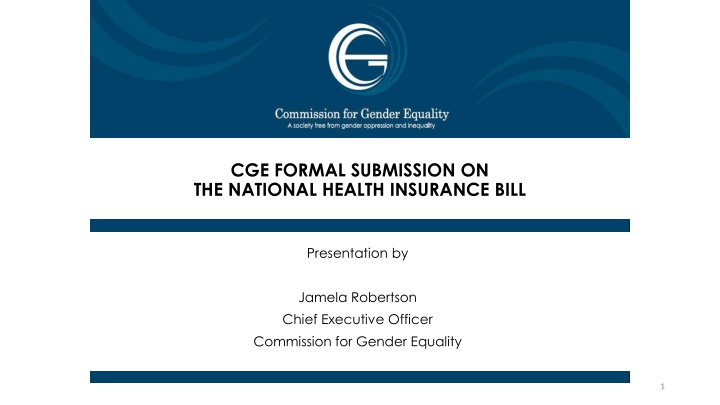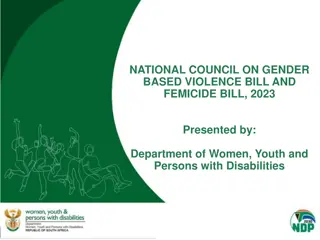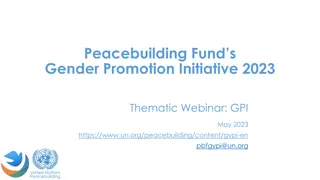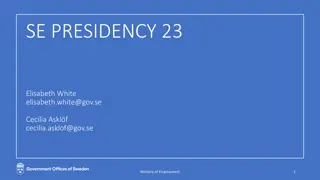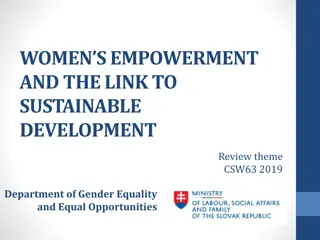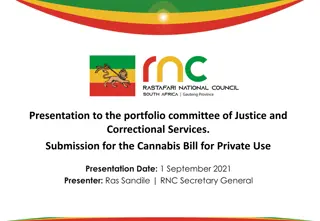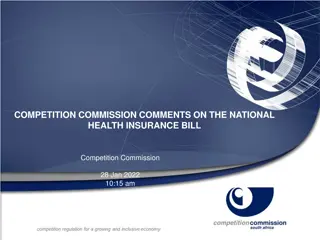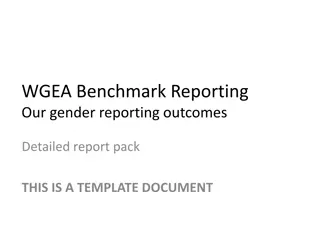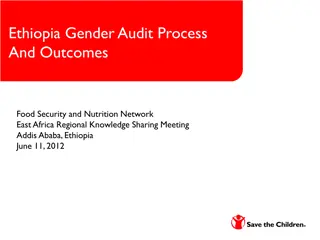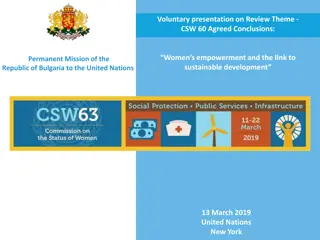Submission on National Health Insurance Bill by Commission for Gender Equality
The Commission for Gender Equality in South Africa presents a formal submission on the National Health Insurance Bill. The submission highlights the importance of promoting gender equality in healthcare and ensuring access to quality health services for all, with a specific focus on women's health needs. Through their mandate, the Commission advocates for policies and practices that support gender equality and aims to make meaningful recommendations to improve healthcare services in the country, especially for vulnerable populations. The submission underscores the significance of the National Health Insurance in addressing disparities and enhancing healthcare outcomes, particularly for women, children, LGBTQIA+ individuals, and persons with disabilities.
Download Presentation

Please find below an Image/Link to download the presentation.
The content on the website is provided AS IS for your information and personal use only. It may not be sold, licensed, or shared on other websites without obtaining consent from the author.If you encounter any issues during the download, it is possible that the publisher has removed the file from their server.
You are allowed to download the files provided on this website for personal or commercial use, subject to the condition that they are used lawfully. All files are the property of their respective owners.
The content on the website is provided AS IS for your information and personal use only. It may not be sold, licensed, or shared on other websites without obtaining consent from the author.
E N D
Presentation Transcript
CGE FORMAL SUBMISSION ON THE NATIONAL HEALTH INSURANCE BILL Presentation by Jamela Robertson Chief Executive Officer Commission for Gender Equality 1
1. INTRODUCTION The Commission for Gender Equality (Commission) is an independent statutory body established in terms of Chapter 9 of the Constitution of the Republic of South Africa, 1996 (Constitution). The Commission has a mandate to promote and protect gender equality in government, civil society and the private sector. To this end, the Commission for Gender Equality Act No. 39 of 1996 as amended (CGE Act) gives the Commission the power to monitor and evaluate policies and practices of organs of state at any level, statutory bodies and functionaries, public bodies and authorities and private businesses, enterprises and institutions in order to promote gender equality and make any recommendations that the Commission deems necessary. 2
INTRODUCTION (Cont.) The Commission also has the powers to evaluate any act of parliament, make recommendations to parliament or any legislature with regards to any law affecting gender equality or the status of women, and may recommend to parliament the adoption of new legislation which will promote gender equality and the status of women. The Commission welcomes the opportunity to make inputs into the National Health Insurance Bill, 2019. 3
2. CONTEXTUAL BACKGROUND Women s reproductive health needs are different from those of men, and as such a one-size-fits-all approach would not be desirable. The NHIB has the propensity to improve women's health if the best interventions are carefully assessed, costed and provided on a universal basis from the outset. In so doing, women and girls will be direct beneficiaries of the National Health Insurance once it is implemented. Consequent to Section 27(1)(a) of the Constitution, women, children, lesbians, gays, bisexual, transsexual, intersexual, queer, asexual have the right to have access to health care services, including reproductive health care. 4
CONTEXTUAL BACKGROUND (Cont.) The Commission records that Goal 3 of United Nations 2030 Sustainable Development Goal obliges States to ensure healthy lives and promote wellbeing for all at all ages. Some of the goals are to reduce maternal mortality, ensure universal access to sexual and reproductive health care-services, including family planning, information and education, and the integration of reproductive health into national strategies and programmes by 2030. Whilst health care services are provided free of charge in South Africa, monetary costs of travel to a local clinic pose a significant barrier for vulnerable segments of the population, specifically women, children, lesbians, gays, bisexual, transsexual, intersexual, queer, asexual (LGBTQIA+), mentally disabled persons and persons with disabilities; leading to overall poorer health. 5
CONTEXTUAL BACKGROUND (Cont.) For example, in 2016, the Commission received a complaint from the Vingerkraal community where it was argued that the nearest local clinic is 45 km away from their community. As such, access to health care services was costly and further placed women to be more vulnerable to all forms of abuses including gender-based violence. From this premise, it is submitted that access to health care services to rural women is fundamental in realising health care rights of the vulnerable groups. The Constitutional Court decision in Soobramoney v Minister of Health 1998 (1) SA 765 (CC) provides apt examination of the aforementioned constitutional right imposed on the State to provide quality medical services to citizens. 6
3. FOCUSSED COMMENTS ON THE NHIB The Commission note the contents of the proposed National Health Insurance Bill (NHIB); however, it would like to make recommendations to the Committee as follows: 7
CHAPTER 1 Purpose and application of Act While the NHIB seeks to promote the achievement of universal access to quality health care services for all in the Republic of South Africa, it fails to address existing human rights violations in the health sector such as structural violence against women and girls manifesting itself in various forms such as: refusal by health care workers to administer contraceptives to girls and young women, forced and coerced sterilization of Human Immunodeficiency Virus (HIV) Positive Women, Violence against pregnant women, the elderly and other vulnerable groups. The NHIB is written in heteronormatively biased language, using pronouns such as he or she and clearly leaving out Gender Non-Conforming Individuals who too are health service users. In other words, the NHIB is gender blind and gender non-responsive. 8
CHAPTER 2 Access to care services Registration as users: the requirement for proof of habitual place of residence as stated in the NHIB as a prerequisite for user registration has the potential to exclude street dwellers who by virtue of being street dwellers do not have such proof This requirement will further contribute to the high rates of maternal deaths as pregnant women living in the streets could be excluded from accessing health care services. The aforementioned concern also applies to persons who reside in rural areas where, often, Traditional Leaders are called upon to provide proof of residence . In certain complaints to the CGE, persons such as LGBTIQA, unmarried women and widows often encounter obstacles and prejudice when seeking the proof of residence from Traditional Authorities. 9
CHAPTER 2 (Cont.) For example, the Bill states that: (8) A user seeking health care services purchased for his or her benefit by the Fund from an accredited health care service provider or health establishment must present proof of registration to that health care service provider or health establishment when seeking those health care services. In addition, the NHIB excludes persons, particularly women who are travelling to South Africa in compliance with the Immigration Act. The Bill does not address how such women would be assisted if they require medical attention. The NHIB states that to get medical attention, the patient must be registered as a healthcare user and to be registered, they would have to comply with the requirements of section 5(5) of the Bill. These groups of persons would not comply, and it is not clear from the NHIB how they would access treatment and care. 10
CHAPTER 2 (Cont.) The reference to Promotion of Equality and Prevention of Unfair Discrimination Act 4 of 2000 (PEPUDA) under paragraph 6 (e) is welcomed however the NHIB fails to articulate what measures will be put in place to prevent discrimination on all the grounds as stated by PEPUDA. This is against the backdrop realization that most vulnerable groups continue to face multiple discrimination at health care services centres on the stated grounds. Examples include, the Life Esidimeni tragedy, a woman tied to a chair in Mamelodi hospital and mentally ill patient burnt in Wentworth hospital etc. It is fundamentally important that monitoring and evaluation be explored in this regard to ensure the protection of human rights. 11
CHAPTER 2 (Cont.) Health Care Services Coverage While the NHIB provides for the user to receive the health care services that the user is entitled to: The Commission is concerned about the multiple struggles to access gender appropriate continuum health care services by the transgender persons, intersex persons, girls and women in South Africa, this section of the NHIB states that (4) treatment must not be funded if a health care service provider demonstrates that (a) no medical necessity exists for the health care service in question; (b) no cost-effective intervention exists for the health care service as determined by a health technology assessment; or (c) the health care product or treatment is not included in the Formulary, except in circumstances where a complementary list has been approved by the Minister. 12
CHAPTER 2 (Cont.) This section has the potential to create an environment leading to denial of services and violation of human rights given that health care service provision is often decided upon by other officials who often use discretion to refuse or not recommend health care services for vulnerable groups such as transgender persons, intersex persons, girls and women. The NHIB needs to state at least the basic tenants of the Formulary to avoid misuse. The current Primary health care service package has the tendency to concentrate on women of child bearing age and exclude before and post child bearing health care services as a priority. In the absence of Women s Health Policy to provide guidance, the NHIB must include basic tenants of women s health care services from cradle to grave sequence. 13
CHAPTER 2 (Cont.) (6) A user who is dissatisfied with the reasons for the decision contemplated in subsection (5)(d) may lodge an appeal in terms of section 43. With regard to the provision above, the CGE s view is that while the NHIB provides the mechanism for dissatisfied individuals to lodge an appeal in terms of section 43, the NHIB is not clear on cases when the person seeking health care services is incapable on making such decisions for example persons living with severe mental incapacity. 14
CHAPTER 2 (Cont.) Furthermore, the NHIB states further that a user (i) must first access health care services at a primary health care level as the entry into the health system; (ii) must adhere to the referral pathways prescribed for health care service providers or health establishments; and (iii) referral pathways; is not entitled to health care services purchased by the Fund if he or she fails to adhere to the prescribed The above provision is prejudicial to pregnant women who prefer to engage their regular gynaecologists or obstetrician and skip a General Practitioner. According to this provision, it means that the Fund would not cover the costs, however it is unclear whether the medical scheme can cover costs. 15
Cost Coverage While this section of the Bill seeks to put assure the health service user that the services will be available free at the point of care , it further sets very stringent measures under which the person seeking health services will have to pay for services: 2) A person or user, as the case may be, must pay for health care services rendered directly, through a voluntary medical insurance scheme or through any other private insurance scheme, if that person or user (a) is not entitled to health care services purchased by the Fund in terms of the provisions of this Act; (b) fails to comply with referral pathways prescribed by a health care service provider or health establishment; (c) seeks services that are not deemed medically necessary by the Benefits Advisory Committee; or (d) seeks treatment that is not included in the Formulary. 16
It is observed that the NHIB fails to articulate what should happen in cases of emergency and persons who face structural problems to register as users and does not mention the basic tenants of the formulary and takes away personal urgency of the person seeking health care services. 17
CHAPTER 4 Constitution and composition of Board The Commission notes the proposed total of 11 board members. The Commission proposes that the composition of the 11 Member Board take into account considerations of diversity and be reflective of the demographics of South Africa. It is submitted that a diversified Board will be able to serve the interests of all South Africans irrespective of their gender and/or sex. 18
CHAPTER 8 Contracting Unit for Primary Health Care (2) A Contracting Unit for Primary Health Care must be comprised of a district hospital, clinics or community health centres and ward-based outreach teams and private providers organised in horizontal networks within a specified geographical sub-district area . . .. In terms of this provision above, the Commission observes that most community care workers in South Africa are women. It is espoused that cautionary measures be taken when community health care workers are contracted to ensure that they are paid appropriate wages that do not under value care their work and the contribution made by them. They must be properly trained to execute their duties to understand applicable, relevant legislations such as Sterilization Act 44 of 1998, National Health Care Act 61 of 2003, etc. 19
CHAPTER 8 (Cont.) For rural residents to have access to health care centres, necessary and appropriate health care services must be available and obtainable in a timely manner. Certain factors must be considered for communities in rural areas such as: a) Financial means of communities to pay for services, b) Means to reach and use services such as transportation to health care centres, c) Lack of doctor-patient confidentiality which often encroaches on the right to dignity and privacy of rural women. The Commission notes various complaints where rural women allege that nurses disclose their HIV status in the corridors. As such most patients lose confidence in the health care services. To this end, it is recommended that the NHIB provides oversight of the standard of services rendered by health care practitioners at rural areas. 20
Office of Health Products Procurement (7) The provisions of this section are subject to public procurement laws and policies of the Republic that give effect to the provisions of section 217 of the Constitution, including the Preferential Procurement Policy Framework Act, 2000 (Act No. 5 of 2000), and the Broad-Based Black Economic Empowerment Act, 2003 (Act No. 53 of 2003). In line with the above provision, it should be understood that women are both consumers and providers of services. Therefore, the Commission submits that the procurement of health products must set aside a quota for women owned entities to fast track the implementation of the Preferential Procurement Policy Framework Act 2000. 21
4. CONCLUSION The Commission finds that the NHIB holds prospects to correct impediments hampering women s access to quality healthcare, including addressing women s reproductive health rights in South Africa. 22
